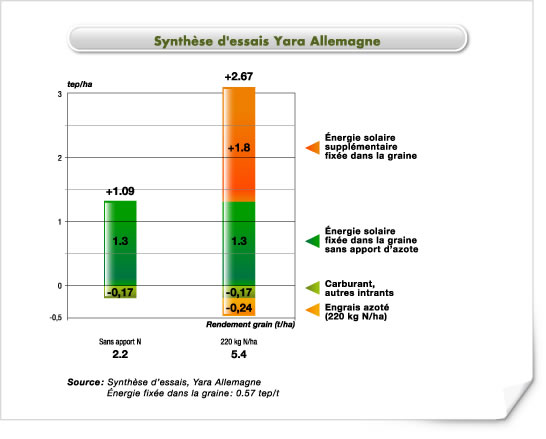Swiss_Knight wrote:In the end it is not so much the quantity of fuel oil necessary for the design of X hay bales that counts but how long would it take us if we had to mow it and bring it by hand? A day ? More ? The amount of energy present in oil is colossal casually ...
If we were to replace this source of energy at the planetary level by the sole strength of our arms and admit, it's true, of a few animals (which should therefore be fed "cultivate" larger areas), we would come back to do the following calculation (at the risk of going into a nasty spin ...):
- how much land (ha) on Earth is cultivable for our annual food energy needs (and those of our 4-legged companions)? 2 billion ha? roughly huh (probably less)
- what food energy value can 1ha produce on average over a year? I don't know damn it, but let's just take a standard 80 kcal potato per 100 g => 800 kcal per kilo => 4184 [Joules / kcal] * 800 [kcal / kg] = 3.35e6 [Joules / kg].
Let’s say that we make 40 tonnes per ha that makes us, pfiou, a lot ...: 40 [t / ha] * 1e3 [kg / t] * 4184 [Joules / kcal] * 800 [kcal / kg] ~ = 1.34e11 [Joules / ha]
=> total Joules that can be produced in the year with only potatoes on Earth: 2e9 [ha] * 1.34e11 [Joules / ha] / 1 [year] ~ = 2.67e20 [Joules / year ]
compare with: annual energy needs (Joules) of 7.5 billion humans (let's assume they are all vegans and eat only potatoes to optimize as much as possible) and put 1 four-legged per 5 people, so 1,5 , 5 billion four-legged (I do not know what it consumes as energy daily a draft animal, but probably 3000x more than us, so we can count as much in 'energy equivalent'). And let's say we work well every day: XNUMX kcal / day / person on average.
=> 7.5e9 * 2 [beings] * 3000 [kcal / day / being] * 4184 [Joules / kcal] * 365 [days / year] = 6.87e19 [Joules / year]
Is the equation soluble and if so what average standard of living would we manage to achieve in the best of cases?
- yes it seems to be, as a first approximation.
The ratio is favorable and is around 4; we can produce 4x more energy than we need to operate our bodies.
But 4x it is not huge and it would be very boring to eat only potatoes, so the production would be less and we can I think quickly fall into a ratio located somewhere between 1 and 2, hardly more.
And with that, we neither fly planes, nor drive cars, nor do we heat anything (by the way, thank you forest wood which would come to support us for that during the winter !!)
The system seems to be in a sort of almost-equilibrium for 20 billion person-equivalents, with a ladle (I simplified to the extreme we agree ...). And that's hopefully all the time.

There are two things that "bother" me, psychologically, let's say;
1) is to know that others before us have known how to do it and that others afterwards we will know (I hope) how to do "without fossil fuels", and that today we are bathed in pseudo-comfort (which is not embarrassing in itself, let's admit it, what's boring is what follows ...) while forgetting at great speed certain ancestral knowledge but oh so vital for the maintenance of our species - in the purely biological sense - on this planet. Knowledge that we absolutely must be able to put forward to transmit it, in case fossil fuels have an end .......... we never know.
I also remain convinced that it is possible to free up time and energy for something other than "energy supply" in a system where fossil fuels no longer exist, thus leaving time for artistic creation. and social exchanges (...). But this saved energy, this time saved over time in the fields, can only be done, in my humble opinion, through cooperation and societal organization, pooling and optimization of knowledge and skills.
2) to note that we waste excessively and absolutely do not know how to complete the cycles that we open, those of the chemical elements important for life in particular. Anything that "goes to the sea" will not be recoverable because it is too diluted. And getting certain chemical elements from the oceans to the interior of the continents is not an easy task (...). A matter that we bequeath on a global scale with incredible generosity, to future generations.
There too, I remain convinced that a better knowledge of ecosystems and how matter flows (major bio-geochemical cycles of the elements) work (...), will be of precious help to us on the one hand to stop destroy them and then promote them.



